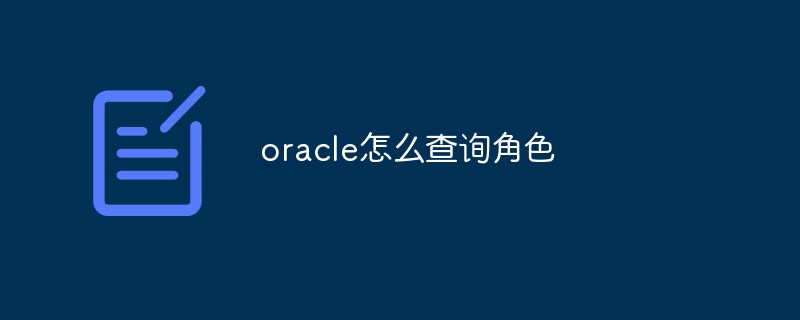Query method: 1. Use "select*from dba_roles;" to view all roles; 2. Use "select*from dba_role_privs;" or "select * from user_role_privs;" to view the roles owned by the current user .

The operating environment of this tutorial: Windows 7 system, Oracle 11g version, Dell G3 computer.
What is a role
A role. A role is a set of permissions. If a role is assigned to a user, the user will have all the permissions in the role.
Permission management is the essence of the Oracle system. Different users who log in to the same database may see different numbers of tables and have different permissions.
Oracle’s permissions are divided into system permissions and data object permissions. There are more than 100 types in total. It would be awkward to authorize users individually. Some users need the same permissions, so these users are classified into the same Class - a certain role, which simplifies and clearly authorizes operations by setting up some roles with predetermined permissions. The motivation for the emergence of roles is to simplify permission management. It is a collection of permissions.
The general approach is: the system assigns permissions to roles, and then assigns the roles to users. Of course, you can also directly assign certain permissions to users. Oracle provides fine-grained permissions. Permissions can be set individually for a certain column of the table, and where restrictions can be automatically added to a user's query of a certain table.
Oracle's roles are stored in the table dba_roles, the system permissions contained in a role are stored in dba_sys_privs, and the object permissions included are stored in dba_tab_privs.
oracle query role
1. View all roles:
select * from dba_roles;
2. View the roles owned by the current user:
select * from dba_role_privs; select * from user_role_privs;
Expand knowledge:
View the system permissions and table-level permissions of the current user
select * from user_sys_privs select * from user_tab_privs
View all tables under the user
select * from user_tables
Display user information (belonging table space)
select default_tablespace,temporary_tablespace from dba_users
Display the permissions of the current session
select * from session_privs
Display the system permissions of the specified user
select * from dba_sys_privs
Display Privileged user
select * from v$pwfile_users
recommended tutorial: "Oracle Tutorial"
The above is the detailed content of How to query roles in oracle. For more information, please follow other related articles on the PHP Chinese website!